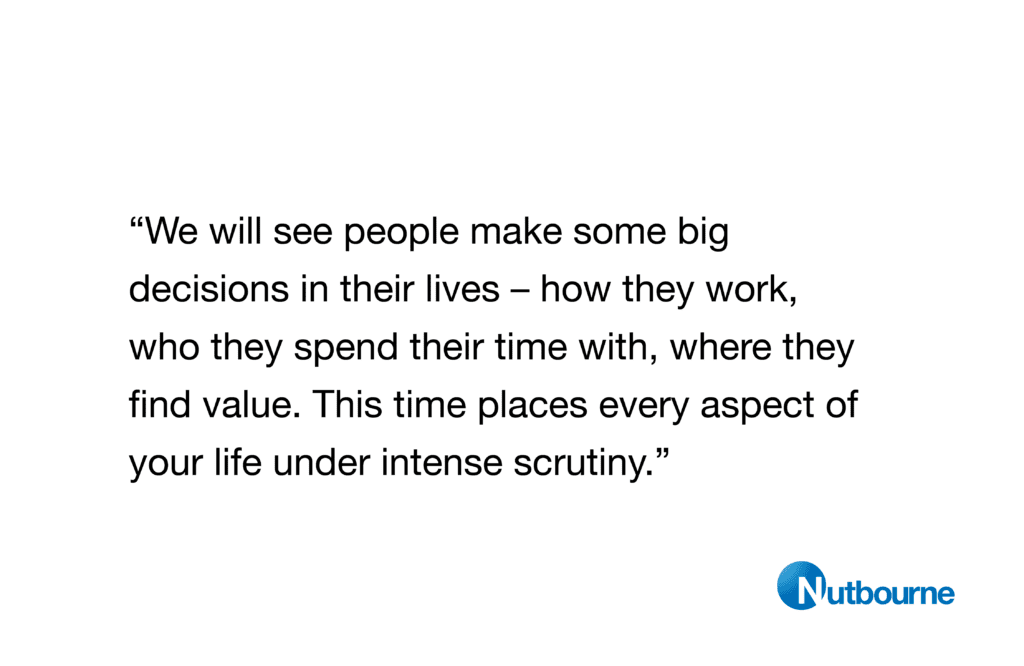As the UK approaches its third month in lockdown and the spread of the coronavirus begins to slow, businesses are beginning the think about scaling operations and returning to life as normal. That normal will look very different from that which we knew prior to March 23 this year. Until we know more about COVID-19 and are able to manage it effectively, measures to contain and prevent its spread will undoubtedly remain in place. In the final part of this three part mini series, Nutbourne Ltd MD Marcus Evans assesses what the business-world could look like 12 months from now.
It’s an employer’s market Nutbourne Ltd say

So what can we expect from working practices 12 months from now? The ensuing recession will see huge redundancies and the resulting shift in attitude from employees toward their employers – and vice versa – will create a new working dynamic. It’s likely that a lot of people will be out of work for an extended period, resulting in many taking a job – any job – in order to simply return to work.
In that scenario, employees will be more receptive to what the company is at that moment in time and have less regard for its aspirations. Conversely those that remain in work will fall into one of two broad categories. On the one hand, we’ll see a continuing or renewed loyalty for the company, or a trenchant dislike for it, fostering resentment because it’s hard, if not impossible, to move on.
There are no prizes for guessing where you’d rather be, but according to Marcus, the latter is something to look out for because it will happen in every company, albeit in varying degrees, and this includes Nutbourne Ltd. He says there will be a group of people that were loyal to the company and will remain so, and another group that have been supported by the organisation through difficulty and will remember that and repay that support with renewed effort and enthusiasm.
“There will always be people that don’t remember the support a company has shown or who will not recognise that this (the global pandemic) is a watershed moment in our history. They will agitate to move or agitate for increased pay or terms that could not be feasible in this time. They don’t see the benefit in a good company, even for the short term.”
Shifting sands
In a wider context, the effects of working from home will cause revelations among the country’s workforce, Marcus says. It will force people to take stock of their lives, re-evaluate their position and make more concerted efforts, simply because they have been faced with uncomfortable circumstances.
“We will see people make some big decisions in their lives – how they work, who they spend their time with, where they find value. This time places every aspect of your life under intense scrutiny.”
Marcus adds that he believes that there will be greater empathy for teachers and nursery workers among the parents who are juggling full time childcare with full time work. It’s exactly the kind of scenario that encourages a mass cultural shift he believes, because it will force both employer and employee to look at their relationship, and how their respective demands are met.
“It brings the discussion back round to what a good company looks like,” Marcus says, “and that manifests in the employees’ attitudes and outlook. I can only speak for Nutbourne in this instance. We’ve had a calm mind and calm attitude and been as clear and transparent as we can on every aspect of the lockdown and how it affects the company.
“In response to that we’ve got every single one of our team really pulling their weight and in some ways we didn’t think they would – to the extent that some aspects of the business have required very little management. It has helped the senior management team to see the whole company in a new light.”
In seven years Nutbourne, remote IT support London, has grown from two employees to 30 managing a whole host of different IT services; in short, he’s used to change and adaptation. So will the change we’ll see post coronavirus come as part of the organisation’s natural evolution? Marcus seems to think so.
“We are already used to implementing new ways of working, and adapting to factors, this shows itself at every level. It’s the natural progression of our journey and should, hopefully, leave us well positioned to keep our forward momentum.”
Market demands
As to whether the company will face more or less demand post lockdown, Marcus is optimistic. There will, he believes, be an inevitable drop off for some clients as revenues decrease, but to counter that he adds that some organisations will have evaluated their IT operation and found it lacking. As ever they’ll be on hand to support new and existing clients in whatever way is necessary.
“In the past, we have seen peaks and troughs between companies that have IT in house and those that have remote support,” Marcus adds. “If a company employs between 80 and 150 staff, IT is generally managed in-house. What we are seeing now, during lockdown, is a seesawing back and forth between companies of that size outsourcing to remote IT support London.
“Now, with companies shrinking and budgets being tight, it will be really interesting to see which way this goes. If you’ve got a standard desktop support engineer, then you are probably going to keep them, even if you dropped from 90 to 60 people. In that scenario, unless you are doing high-end development you are unlikely to keep really expensive technical support in-house full-time – it’s much more likely that hours are reduced or cut. That’s where we are able to support – either picking up slack, or providing additional input that allows the existing setup to excel. Alternatively, you may get rid of internal IT altogether, and this is where we would really be able to help with our managed IT services.
The final point comes back round to idea that lockdown will have shone a light on areas of the business that need improvement. Marcus says that some of the existing clients at Nutbourne Ltd have been in touch to discuss migrating workers back into the office, and how a re-integration plan might look in various scenarios post COVID 19. This is something we too have been considering at our remote IT support London company.
‘Things have changed. You’ve moved lots of your team out, with very short notice, to work remotely. How does this mesh back into a reoccupation of the office, both partial, initially, and fully? Will that change the dynamic? Its an interesting set of questions and one we are looking at.”
If you’d like to find out more about Nutbourne Ltd and their remote IT support London, then get in touch! Contact us today on 0203 137 7273.

